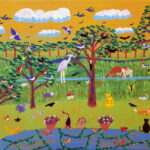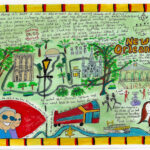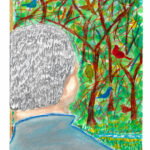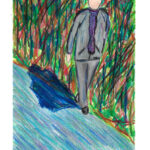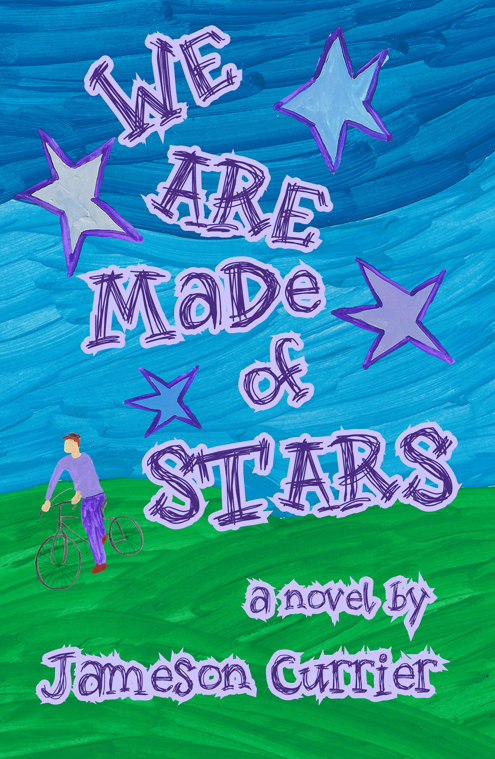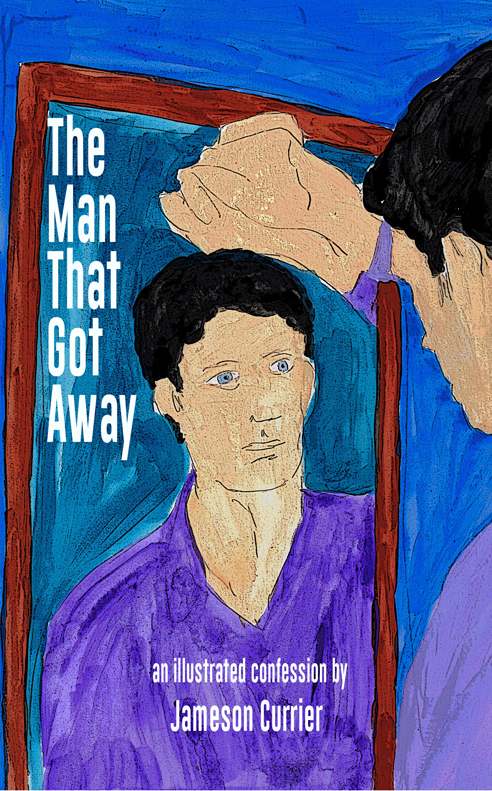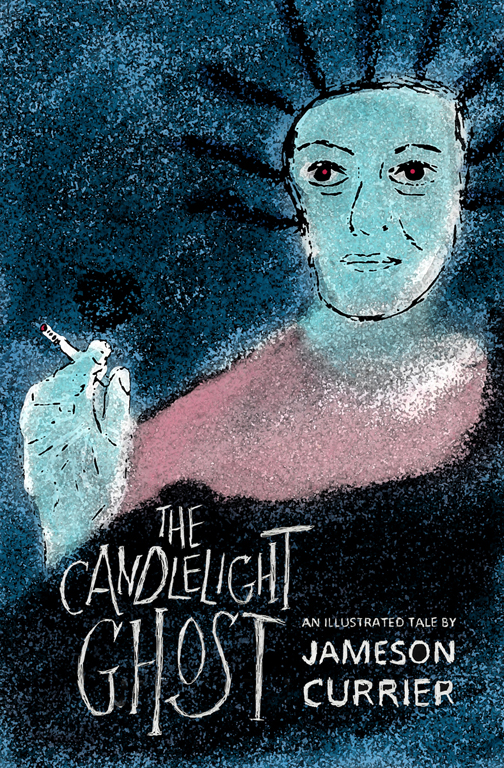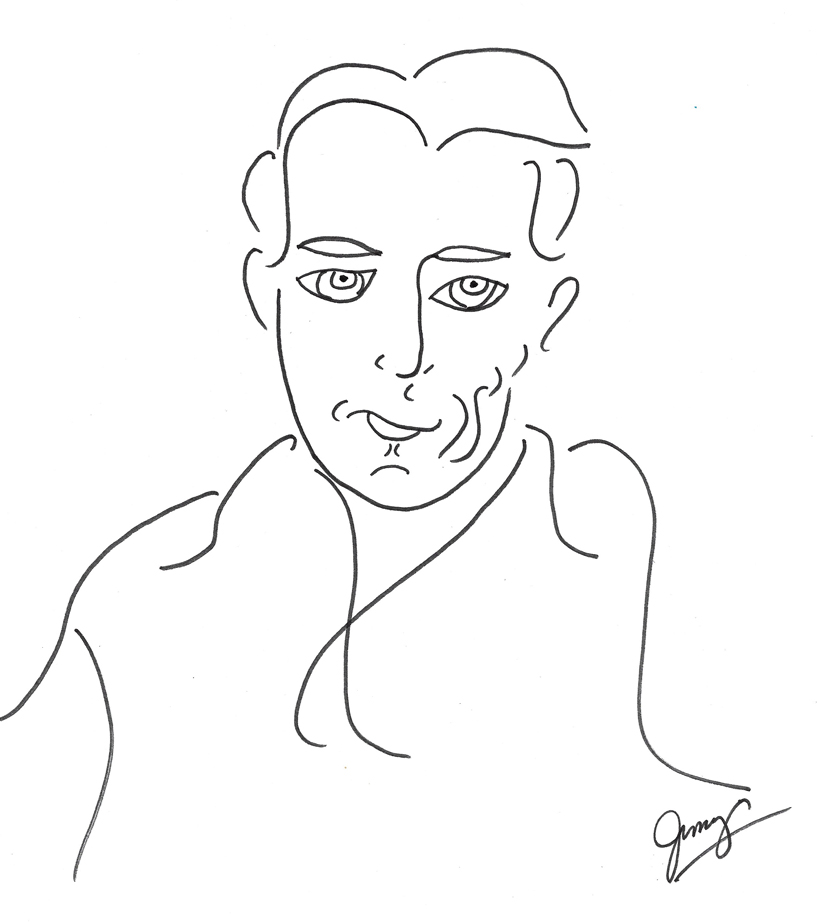
Paul Monette
art by Jameson Currier
Flair pen on 9 x 12 inch sketch paper
20200525012
ON MONETTE
Review by Jameson Currier
Though Paul Monette began his writing career as a poet, his earliest recognition came from the breezy, campy novels he wrote for gay men in the 1970s, most notably Taking Care of Mrs. Carroll and The Gold Diggers.
AIDS, however, changed everything in Monette’s life, from the trajectory of his writing to his relationship with his lover, Roger Horwitz.
Borrowed Time, published in 1988, was Monette’s masterful and unflinching non-fiction account of his lover’s twenty-month battle with AIDS. Love Alone, written shortly after Horwitz’s death in 1986 at the age of forty-four, was a collection of 18 elegiac poems full of the fury and madness of grief over his lover’s death. Four years later, in 1992, Monette’s autobiographical account of growing up gay, Becoming a Man: Half a Life Story, won the National Book Award for Nonfiction.
Last Watch of Night, a collection of ten essays written since the publication of Becoming A Man, was also written while Monette was himself diagnosed with full-blown AIDS, hooked up to “three separate IV drugs,” and swallowing a “small mountain of oral medication.” These essays cover a variety of autobiographical subjects, from meditations on priests, travel, cemeteries and insomnia, to a recollection of the 1993 March on Washington for gay and lesbian rights. Though Monette often uses a digressive narrative structure in these essays, his emotional force never loses its focus. One of the best examples is “Gert,” about Monette’s friendship with Miss Gertrude Macy, Katherine Cornell’s stage manager and former lover and forty years Monette’s elder, and which also slips in a delicious anecdote about the very private Greta Garbo along the way.
The most poignant essay in this collection, however, is “Puck,” a portrait of Monette’s dog but which also reveals the author’s intimate domestic life, as well as the accounting of the death of Monette’s second lover from AIDS and his current relationship with Winston Wilde.
West of Yesterday, East of Summer is a collection of poetry which incorporates ten new poems along with the best from Love Alone and two previous and now-out-of-print collections by Monette, The Carpenter at the Asylum and No Witnesses. Though the earlier poems are mannered, the elegies of Love Alone are monumental landmarks, particularly in the genesis of AIDS literature.
Of the ten newer poems, most are politically driven, especially “The Supreme Pork,” about the Supreme Court’s decision to uphold Georgia’s sodomy law, “Bill,” a skewering of William F. Buckley, and “Nureyev Doesn’t Have AIDS,” about the reluctant acknowledgment of the ballet dancer’s death from the disease.
“Grief is a sword, or it is nothing,” Monette writes in The Last Watch of Night, a bittersweet reminder of the evolution of this author’s career, and that out of the harrowing uncertainties of AIDS, Paul Monette has found his strengths, his voice, and certainly his place in history.
Last Watch of Night: Essays Too Personal and Otherwise
by Paul Monette
(Harcourt Brace, 1994)
__________
Paul Monette died February 10, 1995 at the age of 49.
This review was published as “A Writer’s Progression; Two New Titles Trace Trajectory of Monette’s Career,” in the St. Louis Post-Dispatch, December 11, 1994.
Reviewer’s Note (2024): Along with Oscar Wilde, I share the same birth date as Paul Monette — October 16. Reading Monette’s Borrowed Time (1988), a memoir of his last days with his partner Roger Horwitz, was a turning point for me as a writer, in part because it solidified my reason to write about AIDS and to keep telling the stories of how lives were impacted as well as of those lives that were lost. It also served as an emotional touchstone when I wrote many scenes for my novel, Where the Rainbow Ends (Overlook, 1998).

